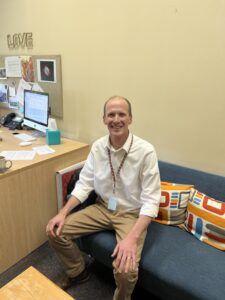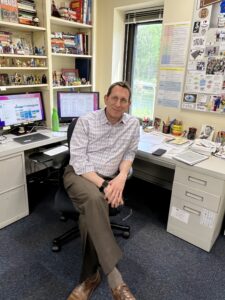
So often, when you visit a place you frequented as a child, you think, “It looks so small.” But The Park School of Baltimore, where I attended 9th through 12th grades, seemed bigger. It’s a big place where big things are happening.
When I talked to each of the interview subjects for this article, I imagined myself as one of their students. I felt safe, validated, and like these people really cared–in every moment I was with them–that I get the most out of the experience. Our time was limited to thirty or so minutes, so it gained a heightened sense of “now-ness”.
In this “now-ness” I saw that Park has gotten more Park since I left. That’s why I was there, to find out how it had become more of what it always has been. But I wasn’t prepared to meet the truly extraordinary people I met.
Founding and Foundations
Park was founded by Baltimore Jewish families in 1912. They wanted their children to have the opportunity to have a secular, independent education. Most of the independent schools in Baltimore at the time were parochial. Park’s educational philosophy is a radically different one in comparison to other independent schools in the area. It sees students as partners with their teachers in their own education; it’s underpinning is a belief that students want to learn, and if treated that way, they will achieve great heights; and, it doesn’t see punishment as a valuable approach in guiding students through their educational journeys.
Park’s philosophy also assumes students care, about each other and the world. In my four visits there in pursuit of this article. I could see the students love each other. And the teachers love the students. From a place of love, education becomes a way to say to students, “This is an interesting, important thing about the world, and here is how it affects you. I want you to know this because I care about you.”
Rewards for Rich Espey
The kids are excited to learn, in part because the teachers, administrators, and staff show them how what they’re learning affects their lives. I met Middle Science teacher, Rich Espey in one of the classrooms he teaches in and there was an easy, fun vibe. There, among the long, black desks and paper neurons on the wall, we talked about what it’s like for him to teach science to middle school children. I can remember when I attended Park (class of ’95) feeling like my teachers expected excellence from me. I didn’t always deliver, but it was uplifting, and frankly, a game changer.
“It’s my greatest reward when students really enjoy learning, and they get excited about something,” Rich said. He smiled and leaned on his right elbow.” He said it always makes him go, “wow”, even after 21 years at Park, when students ask, “When can we get started?” or express disappointment when class is over.
When Rich’s “house” (like homeroom) came into the room to be apprised of the days “housekeeping” issues, Rich gave them information on this year’s Holi Run. Holi is a Hindu religious rite celebrating the coming of spring, in which participants throw multi-colored dyes at each other. None of the students looked like this was news to them. I took note. These are advanced people, who understand–celebrate–that there are as many ways to live a life as there are people in the world. They were also polite a greeted me warmly.
It’s so important that students feel safe in a learning environment. I didn’t always feel safe in my independent school journey (before Park), and perhaps this is part of why I didn’t apply myself in a committed way to my studies (before Park).
Related: It’s Teacher Appreciation Week! See what Sen. Guy Guzzone (D-13) said about a teacher who influenced him.
Rich took over Park’s Gay Straight Alliance in 2005. By 2010 it had become the Affinity Group. All who identify as anything–gender and sexual minorities, race, religion, anything–are welcome to join.
“I really want every student to think for themselves, to be able to solve their own problems, and to think of problems that need to be solved,” Rich said.
“Park was the first school I taught at that would do any sort of LGBTQ+ anything,” Rich said, casting no aspersions, he made it clear, on the other places he’d worked. I, too, don’t mean to say my previous independent school education (K-8) didn’t have a lot of wonderful things about it. It was a rigorous, advanced curriculum taught by educators who did care and gave me knowledge and skills I still use today. But I also heard the “f” slur used by both students and teachers more times than I can count. And each time, being gay, as I identified at the time, I retreated further into myself and learned that it was not at all OK to be who I was. I was bullied mercilessly, and I had no recourse except to fake illness to stay home from school.
People are “miles apart” on so many academic metrics, so to see that each is getting what they require takes a great deal of dedication, I could just tell by the look on Rich’s face. It was concern mixed with joy with a dash of impetuousness.
“I think a lot of people would be surprised to know how motivated kids are when you don’t give grades,” Rich said of teaching Park middle-schoolers. Park doesn’t give its students grades until high school. On it’s face, this says so much about Park’s greatness. Park’s teachers eschew simplistic notions of evaluation and prefer to offer ideas on how a student got to a given answer and why. And perhaps this is why during my four visits to the school for this article, all the students I met or even saw seemed so…grown up! They behaved like mature adults who take learning seriously but don’t need either/or feedback on their work. They deserve more than that. And Park gives it to them.
I was struck, again, by how caring the students seemed. I saw hugs, hand-holding, and simple looks of acknowledgment exchanged between then. Maybe it’s because they know the school cares about them. Rich told me of a summer project he and some other faculty took part in called, “Putting Gay In a Positive Context.”
“It was like little things you can do in your classroom starting tomorrow to affirm students across the gender and sexuality diversity spectrum,” he told me. It truly uplifted the culture at the school, he said.
And: Read all about my favorite teacher…who never actually taught me!
Rich hopes that, with all the concentration on technological aptitude, because our world is technology, the life sciences won’t get left behind. He said he’d love to build a greenhouse for students. And one of his classes had just completed a project in which they designed a healthy meal. One example was the students got to create a salsa for faculty judges, and they really enjoyed it.
Learning About Matt-ematics
I asked Josh Lauren (’03), Park’s Alumni Director, why someone should donate to Park.
“Park School opened horizons for me as a learner and critical thinker. You should give back to Park to support the school’s mission and to make Park School accessible to as many children as possible,” was his reply.
I was like the White Rabbit in “Alice In Wonderland” on my way to meet Matt Doyle, Lower School Principal. I was one minute late! Disheveled and breathless, I noticed someone walking toward me at a regular step, almost with the rhythm of a dancer…who was keeping a watchful eye on all that was going on around him. I knew instantly it was Matt.
“The greatest reward in my work, which is to create engaged citizens, is seeing students full of wonder, joy, and amazement. And faculty members,” Matt told me.
 Matt Doyle’s office was a place of soothing neutral colors, offset by the school color, brown. He confirmed something I noticed in talking to my interviewees: people don’t leave Park. These educators have been there for multiple decades each. It says something wonderful about Park that it supports its teachers in such a way that it becomes a working environment that people want to stay in.
Matt Doyle’s office was a place of soothing neutral colors, offset by the school color, brown. He confirmed something I noticed in talking to my interviewees: people don’t leave Park. These educators have been there for multiple decades each. It says something wonderful about Park that it supports its teachers in such a way that it becomes a working environment that people want to stay in.
Many of my own teachers when I was there from 1991 to 1995 had been there for multiple decades too. Another Park graduate (and, full disclosure: a close friend of mine), Liesa Abrams said her Park education played a central role in her entry into the world of publishing. She edits Young Adult Fiction at her own imprint, Labyrinth Road, a division of Penguin Random House.
“Park was a place where I felt safe to be fully who I was, where teachers encouraged me to believe in myself and envision a future,” she told me in a WhatsApp exchange.
Those would be teachers like Matt Doyle, who, again, has been at Park for more than 18 years for example. He got his graduate degree in School Counseling while teaching at Park.
“Park worked with me and made sure I could stay here and flex my schedule a bit,” he said. He told me his broad goal as Head of the Lower School is enacting Park’s educational philosophy. “So curiosity and process are at the center of that. And the students are at the center of that.” It’s not just nurturing, he said, though that’s a part of it, that goes on at all levels in the Lower School. “It’s deeply listening, holding each other accountable. People here push one another to be their best.” I felt like Matt’s perspective on this independent school was especially significant because he attended another local, independent school.
This is Matt’s first year as Head of the Lower School, and as bells rang and students chattered in the hallways, he told me he loves seeing the “joy, amazement, and wonder” the kids experience every day.
Lower school, he said, surprises him every day. “The rate of learning and development is greater in the early younger years,” he said. Every day there’s something that makes him go, “Whoa!”
Matt has his eye on the future, too.
“My ‘next year’ list is packed with questions and ideas that stem from teachers, parents, and students big and small,” he told me.
Wondering With Josh Wolf
Josh Wolf is Head of the Middle School. I can best describe his office decor as art deco meets young adult book jacket. Serious but fun, like him, I would come to know. He attended Pikesville High School and then went on to the University of Pennsylvania. His two sons attend upper school, and his daughter just graduated from college. He pointed out a black-and-white photo of her with pride.  I asked him which the movie star he’d framed a picture of and placed on his desk. It was his father, but he wasn’t in movies. I thought it was notable that his father’s picture was nestled among papers, books, and pens and pencils, because it showed that his father was as fundamental to his work as head of the lower school as any of those requisite school supplies.
I asked him which the movie star he’d framed a picture of and placed on his desk. It was his father, but he wasn’t in movies. I thought it was notable that his father’s picture was nestled among papers, books, and pens and pencils, because it showed that his father was as fundamental to his work as head of the lower school as any of those requisite school supplies.
I could see Josh cares about the kids he is in charge of in the middle school in a way that’s similar to the way he cares for his own kids. He takes their education seriously. He told me there’s so much information out there these days, and people are always partially paying attention to all of it. He wants his students to learn how to process that information. If those were the words of a less intelligent person, “process” might have seemed like jargon. But coming from Josh, I knew it meant he wanted the kids to know what to be able to identify quality information and how it can help them make good decisions.
“If I can create an environment where kids feel good about being here and they’re able to engage, and the teachers don’t feel overburdened, then I’m doing my job,” Josh said.
Along with a big vision of how to instantiate Park’s progressive ideals in a world that’s changing so fast, Josh deals with a lot of “administrivia”–a word I loved–on a daily basis. Josh teaches an eighth grade class, too, on digital literacy. He recommended a book to me, Scythe by Neal Shusterman. He said it’s not a dystopian vision of a world immersed in technology, but simply a vision.
“I get to go into classes and observe, and it’s incredible,” he said. “I see everything that’s happening across the middle school.” This way he can stay in touch with parents and let them know all the amazing things their kids are doing.
There’s so much Josh and his fellow educators want to teach the middle schoolers–from traditional classes to life skills classes to outdoor education ones–fitting that all into each day isn’t easy. “We have to prioritize what’s important, and figuring out how to do that is a lot of what we do.”
“I care deeply about clarity and organization,” Josh said. “Life can be confusing, so people”–I would imagine middle school kids more than anyone!–“appreciate clarity.”
I could see how valuable it was to have Josh, a former teacher (of Spanish to middle and upper schoolers) be the head of the middle school. For a moment he went all teacher on me. But it was exciting and fun! In talking about the book Scythe, he said the main problem in the world in it is overpopulation. Arguably, this is the main problem in our world, too, I said.
Josh said he’d love to take his middle schoolers on trips around the world, like to Ecuador. And he said it with this perfect Spanish accent, fluid and luxurious. He looked out the window, deep in thought.
Then he told me, one thing that’s changed under his leadership is that instead of a speech delivered on a “polemic topic” at the end of the eighth grade. Now, he said demurely, he’s “helped along” a project that teaches kids about advocacy. What does it mean to make change in the world? I’d heard the phrase “DEI”, for “Diversity, Equity, and Inclusion”, before. But I hadn’t heard a “B” added onto it, which Josh did as we spoke of that acronym’s important. “B” stands for belonging. I looked out at the impressive STEM building under construction, visible from Josh’s office, and the pond that’s been there since as long as I remember, at least. I thought how when I came to Park, I felt like I had found a place I belonged. I could only imagine how with an eye on making “belonging” a priority, students must benefit immensely. Again, the ideal learning environment would be one where students feel like it’s their place. They’re not borrowing it to kill time or being forced into it to keep them off the streets. It’s theirs. And they join the teachers in making it an extraordinary place where extraordinary things happen.
And: Here’s a another teacher–Del. Frank Turner!
Thanks for reading! Check back with us each here at rocoinhoco.com every week as Robert, Colleen (and pup, Moses) get to know the many facets—one each week–of this prismatic place called Howard County. They want to take you along with them, so follow us on Twitter at @rocoinhoco, join our Facebook group, and follow us on Instagram at @rocoinhoco.
